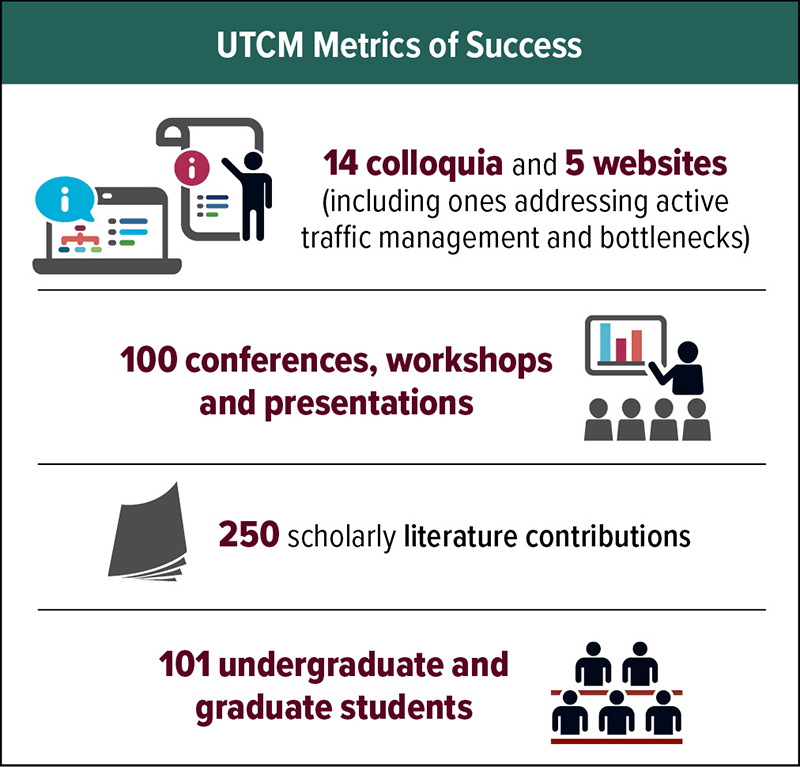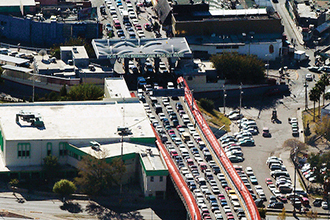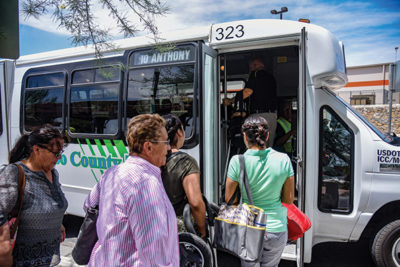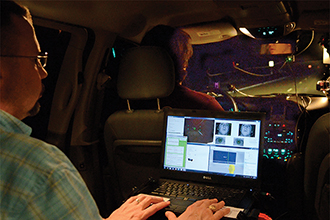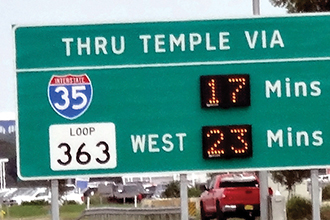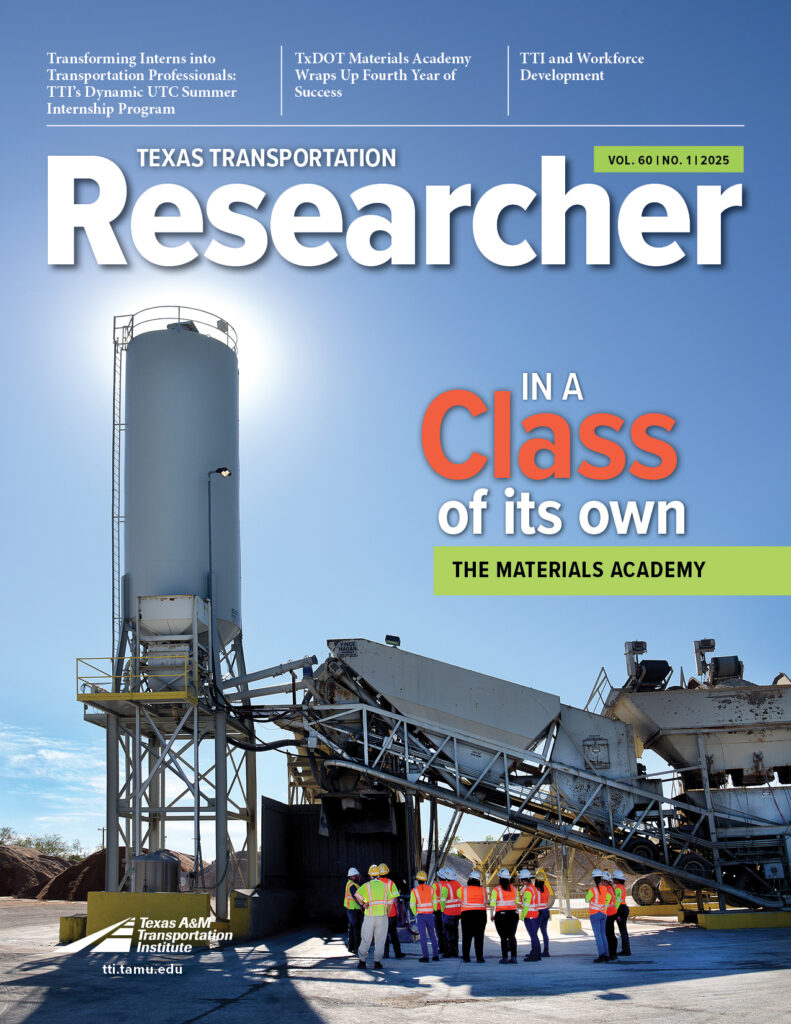Over Three Decades of Leadership and Contribution: TTI’s University Transportation Centers
FROM VOLUME 57, NUMBER 2 (2021)
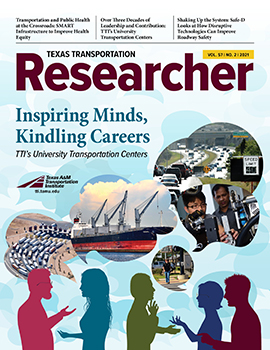
FROM VOLUME 57,
NUMBER 2 (2021)
In 1987, the U.S. Congress authorized the U.S. Department of Transportation University Transportation Center (UTC) Program, establishing 10 federal regional UTCs across the country. The UTC Program was designed to improve transportation research in the United States by advancing technology and expertise across multiple modes of transportation while addressing vital workforce needs for the next generation of transportation leaders. The program is unique in that it is based on three tenets: research, education and technology transfer.
The Texas A&M Transportation Institute’s (TTI’s) then-Agency Director Charley Wootan played a key role in advancing this landmark legislation and competitive program. He established and actively led the Council of University Transportation Centers to advise the federal government on how to most effectively explore long-term, applied research in transportation. Since then, TTI has been the lead university for three UTCs and has partnered with other national consortia in five others.
“TTI has made extensive contributions to the body of knowledge and state of the practice in transportation through the UTC Program. Many of our most impactful programs were initiated or supported with UTC seed funding,” states TTI Senior Research Engineer and Director of External Initiatives Melissa Tooley. “Many students and researchers have been introduced to transportation through TTI’s UTCs and gone on to transportation careers, enriching the transportation workforce. And the program’s continued emphasis on technology transfer ensures that research becomes best practice. We look forward to what the future holds with this program.”
Southwest Region University Transportation Center
In 1988, Texas A&M University/TTI became home to the Southwest Region University Transportation Center (SWUTC) after the first competition. The other universities involved in SWUTC included The University of Texas at Austin, Texas Southern University, Louisiana State University and the University of New Orleans. Under the leadership of Dock Burke for its first 25 years and Melissa Tooley for its last three years, SWUTC stood as one of the most successful UTCs in the nation, providing a case study for how to leverage state and federal funding, as well as university partnerships, to advance cooperative research projects that benefit the region and the nation. SWUTC’s research was implemented in new pavement materials and design methods, innovative transit service programs, dynamic travel-demand management, and more.
University Transportation Center for Mobility
With the passage of the 2005 U.S. transportation bill, the Safe, Accountable, Flexible, Efficient Transportation Equity Act: A Legacy for Users, TTI was awarded the University Transportation Center for Mobility (UTCM), one of 60 UTCs created nationwide. Over the center’s six years of operation, Center Director Melissa Tooley managed $6 million in federal funds and awarded 78 research projects, nearly half involving interdisciplinary collaborations with Texas A&M academic partners like the Bush School of Government and Public Service and the Departments of Agricultural Economics, Civil Engineering, and Landscape Architecture and Urban Planning. The center’s legacy includes creating, in 2008, an interdisciplinary graduate certification program in transportation planning at Texas A&M in collaboration with its partners. To date, more than 70 students have graduated with this certificate.
UTCM Interdisciplinary Collaborative Partners
- Booz Allen
- Chevron
- INRIX
- Prairie View A&M University
- Texas Department of Transportation
- Texas Southern University
- The University of Texas at Austin
- The University of Texas at El Paso
- Walmart
- Wisconsin Department of Transportation
- World Bank
TTI’s UTC History
Southwest Region University Transportation Center
(1988–2016)
Lead institution: The Texas A&M University System (including TTI)
Partners: The University of Texas at Austin and Texas Southern University, with Louisiana State University and the University of New Orleans added with the Moving Ahead for Progress in the 21st Century Act competition
Focus area: Economic growth and trade, enhancement of mobility, and development of the the transportation workforce
TTI lead: Dock Burke and Melissa Tooley
The University Transportation Center for Mobility
(2006–2012)
Lead institution: TTI
Partner: The Texas A&M University System
Focus area: Enhanced mobility contributing to improved quality of life
TTI lead: Melissa Tooley
National Center for Transit Research
(2013–2017)
Lead institution: The University of South Florida
Partners: TTI, the University of Illinois at Chicago, Florida International University and North Dakota State University
Focus area: Transit services in rural communities
TTI lead: Linda Cherrington
Center for Advancing Transportation Leadership and Safety
(2014–2017)
Lead institution: The University of Michigan Transportation Research Institute
Partner: TTI
Focus area: Transportation safety
TTI lead: Robert Wunderlich
Center for Advancing Research in Transportation Emissions, Energy, and Health
(2016–present)
Lead institution: TTI
Partners: Johns Hopkins University, the Georgia Institute of Technology, The University of Texas at El Paso and the University of California, Riverside
Focus area: Transportation emissions’ impact on the environment and public health
TTI lead: Joe Zietsman
Maritime Transportation Research and Education Center
(2016–present)
Lead institution: University of Arkansas
Partners: Jackson State University, Louisiana State University, the University of New Orleans, Texas A&M University/TTI and Vanderbilt University
Focus area: Multidisciplinary maritime and multimodal research, education and technology transfer
TTI lead: Jim Kruse
Safety through Disruption University Transportation Center
(2016–present)
Lead institution: Virginia Tech Transportation Institute
Partners: TTI and San Diego State University
Focus area: Potential safety benefits of disruptive technologies
TTI lead: Sue Chrysler
National Institute for Congestion Reduction
(2019–present)
Lead institution: The University of South Florida
Partners: TTI, the University of California–Berkeley and the University of Puerto Rico at Mayagüez
Focus area: Reduce surface transportation congestion
TTI lead: Melissa Tooley
For more information, Contact


